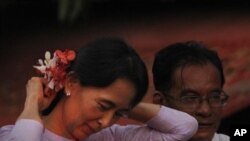Aung San Suu Kyi, 65, is the daughter of Burma's independence leader Aung San, who was assassinated when she was a child.
But she lived abroad most of her life and despite her father's legacy, did not become involved in Burma's politics until 1988 when pro-democracy protests swept the country.
As the leader of the National League for Democracy, she led the party to victory in 1990 elections. But the military, which has ruled for five decades, ignored the results and locked up Aung San Suu Kyi for most of the past 20 years.
"Aung San Suu Kyi is an icon," said Thitinan Pongsudhirak, director of the Institute of Security and International Studies at Thailand's Chulalongkorn University. "She won a Nobel Peace prize. She has suffered so much. The NLD won the last election. They won the last election in 1990. So, they've been robbed for 20 years. This has been a systematic, two-decades-long usurpation."
Aung San Suu Kyi was awarded the Nobel Peace Prize in 1991 for her efforts to bring democracy to Burma. She was released from house arrest in 2002 and huge crowds gathered across the country to hear her speak. But one year later the government put her back in detention after a pro-military group attacked her convoy.
The government claimed the house arrest was for her protection. But it later extended her detention after convicting Aung San Suu Kyi of violating the terms of her house arrest after an American man swam a lake to reach her home.
Thitinan says the ruling generals have done everything in their power to harass, intimidate, coerce, and marginalize Aung San Suu Kyi. Thousands of her supporters, who simply call her "The Lady," have been imprisoned for opposing the military. But despite this, and the years of being largely cut off from the outside world, he says Aung San Suu Kyi remains a potent symbol for advocates of democracy in Burma.
"She symbolizes and personifies many of the hopes and dreams of the Burmese people, of course," added Thitinan. "And, she has earned that over the last two decades through her sufferings, through her democratic ideals, through her crusade, and through her demonstration of her personal will at the expense of her family, at the expense of her own health, and so on."
Aung San Suu Kyi studied at Oxford, married British academic Michael Aris, and had two sons. When her husband in England was sick with cancer she chose not to visit him for fear she would not be allowed back into Burma. The military would not allow him a visa to visit her. He died in 1999, having not seen his wife for several years.




